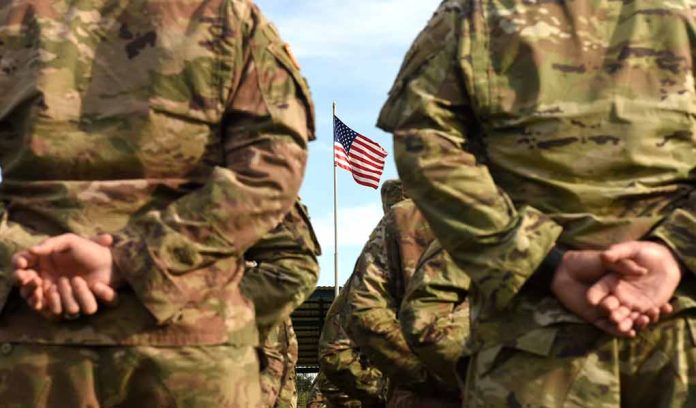
New Mexico Governor deploys National Guard to Albuquerque to combat soaring juvenile crime and fentanyl epidemic while critics question if this approach is enough to address root causes.
Key Takeaways
- Governor Michelle Lujan Grisham ordered 60-70 National Guard personnel to deploy to Albuquerque by mid-May to assist with non-enforcement duties.
- The National Guard will handle tasks like traffic control and prisoner transport, freeing police to focus on addressing juvenile crime and fentanyl trafficking.
- Republican critics argue the measure is insufficient without bail reform and tougher penalties for offenders.
- Operation Route 66 has already yielded 2,700 seized fentanyl pills and nearly 400 arrests, highlighting the severity of the drug crisis.
- Fentanyl was involved in 65% of overdose deaths in New Mexico in 2023, underscoring the urgency of additional resources.
National Guard Deployment and Mission
New Mexico Governor Michelle Lujan Grisham signed an executive order to deploy between 60 and 70 National Guard personnel to Albuquerque by mid-May. The deployment targets what the governor described as “critical issues requiring immediate intervention” – specifically the fentanyl epidemic and rising juvenile crime rates that have plagued the city. The National Guard members will not directly engage in law enforcement activities but instead perform supportive functions such as scene security, traffic control, and prisoner transport.
These assignments aim to free up Albuquerque police officers from administrative tasks so they can focus more effectively on addressing crime. The guard personnel will be unarmed and dressed in civilian clothing to minimize disruption within the community while providing much-needed support to local law enforcement agencies that have been stretched thin by ongoing crime issues.
If crime in ABQ is down, then why do we need the National Guard to assist APD with handling crime?#nmpol #kellerkrime @NicoleforNM @MayorKeller pic.twitter.com/oCHjddA6G5
— New Mexico Senate Republicans (@NMSenate_GOP) April 9, 2025
Juvenile Crime and Fentanyl Crisis
Albuquerque has witnessed a troubling rise in juvenile crime over recent years. From 2019 to 2024, Albuquerque police have arrested or cited 2,600 minors aged 11 to 17 for various offenses. One recent case highlighted the severity of the situation when a 13-year-old boy was charged with first-degree murder following a fatal car accident. Authorities connected the same youth to a series of burglaries, exemplifying the escalating nature of juvenile involvement in serious criminal activity across the city.
Simultaneously, the fentanyl crisis has reached alarming proportions, with the synthetic opioid involved in 65% of all overdose deaths in New Mexico in 2023. Bernalillo County Sheriff John Allen reported significant progress through Operation Route 66, which has already resulted in the seizure of 2,700 fentanyl pills and nearly 400 arrests. A particularly problematic 2-mile stretch along Central Avenue has become known as a hotspot for homelessness and drug abuse, requiring constant law enforcement attention.
Republican Criticism and Alternative Proposals
The National Guard deployment has faced criticism from Republican officials who question its effectiveness in addressing the root causes of crime. Leticia Muñoz, Executive Director of the New Mexico Republican Party, described the measure as insufficient without accompanying policy changes. She has advocated for more comprehensive reforms, particularly targeting the state’s bail system and implementing harsher penalties for repeat offenders.
Muñoz has been particularly critical of a proposed pilot program that would offer housing assistance to juvenile suspects following their release from detention, describing it as “coddling” young offenders rather than holding them accountable. The Republican position emphasizes that addressing crime requires stricter consequences rather than supportive services, creating a sharp contrast with the current administration’s approach to juvenile justice reform.
Community Reactions
Albuquerque residents have expressed mixed reactions to the National Guard deployment. Some citizens, like Will Stephens, a retired chef who regularly encounters drug users near his home, welcome the additional support for law enforcement. Stephens has described the daily challenges of dealing with drug-related activity in his neighborhood and supports efforts to address these problems through increased law enforcement presence.
Mayor Tim Keller has pointed to recent decreases in crime rates as evidence that current strategies are working, stating, “We’re finally seeing a sustained positive shift in most crime trends for the first time in decades, and now is the time to build on that momentum.” However, the ACLU of New Mexico has raised concerns about potential civil rights violations that could result from increased policing efforts, particularly in neighborhoods that already experience significant law enforcement presence.
Sources:
National Guard to help Albuquerque fight crime, but some wonder if it’s necessary







